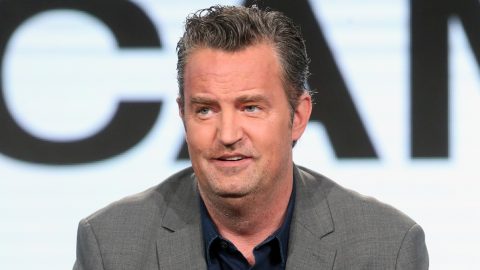
Rex Orange County is all smiles. Well, kind of. During his debut NME cover shoot, he stands relaxed in front of a bright yellow-backdrop, holding a sunflower in bloom. The 23-year-old’s face, however, may not entirely match the set-up our photographer has conjured: the expression he frequently wears is a tad more mellow than his surroundings – wide-eyed, straight-faced – but in his current era, Rex Orange County has never felt so fulfilled and satisfied. Honestly.
The world that Alex O’Connor has built around himself is one of joy, calmness and understanding. The fan community he’s amassed is so aggressively peaceful that rival toxic Twitter stan groups would combust at the thought of it. For example, in one scene in the 2020 documentary Funny How Things Go From One Thing To Another, a behind-the-scenes look at his aborted ‘Pony’ tour in the run-up to the pandemic, O’Connor is too sick to play a show during his last US tour. He’s understandably gutted. But the fans simply take it in their stride, writing messages in the snow-dusted tour bus telling him to “get well soon”. There’s no fall-out or tears shed – the show simply doesn’t happen… and everyone seems fine about it.

On his fourth album ‘Who Cares?’, out March 11, it feels like that relentless positivity is accurately represented in his music. “I’m having so much fun where I’m at right now,” he tells NME in the side-room of a photo studio in Shoreditch, east London. “I want the music to sound and feel free, because I feel free in a sense. I wasn’t in the best place from COVID to now, but I’m more independent in my life and in a better place. I’m not worrying about what I’m saying and how it’s being construed by people.”
‘Who Cares?’ wouldn’t be the ideal album title for most – risking, as it does, tempting fate about its reception – but it aptly sets the mood: the songs are breezy and funky, where light streams in and illuminates every corner of these creations. Recorded in a 12-day stint in Amsterdam with collaborator Benny Sings (who produced 2017 single ‘Loving Is Easy’), it’s a record with emotional heft, but feather-light in comparison to his previous work. The creator’s contented approach is invigorating.
“I cared for a long, long time about what people would think about me and I found it a bit difficult to know who I was,” he says. “Once you make the choice about putting yourself out there, you ask for people to pay attention. Then as soon as you do, you’re like, ‘Oh God – why did I do that?’”

Whereas the songs on his previous release appear directed at others, ‘Who Cares?’ stresses the importance of sometimes putting yourself first, and being the main character in your own life. For example, ‘Keep It Up’’s upbeat message is strikingly clear: “You no longer owe the strangers” Rex croons, admitting that “I never give myself respect”. On the album’s lead single ‘Amazing’, he says that if you “search the definition of afraid… you’ll see my face”, but by the chorus, he’s praising someone who “came and saved me”. It feels as if he’s talking to an unearthed side of himself, more than to anyone else.
“I’m definitely more comfortable with who I am now,” he explains, “and it just took time and growing up. I relaxed a bit and became a bit less resentful and more accepting of how I am. I used to hate how I looked, my voice and the way I came across… but I realised that I can’t change these things and who I am.”
He adds: “There’s a line in the Serenity Prayer that says: ‘Accept the things that you can’t change, and have the courage to have the things that you can’. And that’s life to me. I now have this feeling of mental freedom.”

That aforementioned documentary portrays O’Connor as he is: a really rather nice young man. He’s an understated star – he currently boasts more than 13million monthly listeners on Spotify – and one who could plausibly be from any country in the world. O’Connor grew up in Grayshott, a small village in Surrey, but on occasions he dips into an Alex Turner-style transatlantic twang. And if he likes the question that’s been posed to him (when did this music career finally feel real?), he’ll thank you for conjuring up pleasing memories (the answer is his first New York headline shows, in 2017, at the small venue Sunnyvale, by the way).
O’Connor’s popularity can be put down to the ease with which he transcends generations and taste boundaries. If you’re a heartbroken teen, the rawness of 2015 debut ‘Bcos U Will Never B Free’ will cut too close to the bone, but if you’re loved-up, the gooeyness of his second album ‘Apricot Princess’ will warm your soul. For the old(er) heads, there are flashes of the great singer-songwriters that O’Connor worships: Paul Simon, Randy Newman, ABBA, Stevie Wonder and Hall & Oates.
“Tyler, The Creator taught me a lot by giving me a mirror to look at what I did on my own”
In 2018, NME put Rex Orange County at the centre of ‘schmaltzcore’, a wave of easy-listening and emotionally raw British music made by young men like O’Connor, Matt Maltese, Tom Misch, among others. “They may sound like Jamie Cullum,” NME said, “but scratch the surface and you’ll discover a very mild-mannered teenage riot.” One fan described the music as “knowingly cheesy”.
It laid the groundwork for the No-Genre Generation of musicians we have today. O’Connor was unafraid to namecheck less ‘trendy’ influences, and gleefully tapped into the past to unearth methods of delivering universal emotions. They weren’t chasing a specific sound, but a precise feeling. They were young, raw creatives trying to establish their places in the world with songs stuffed with sentiment.

Did that cohort of artists precede the Gen Z candour we see today in pop music? “I don’t think it has anything to do with me, but I think it’s more OK to talk about your emotions publicly,” he counters. “There’s something about relatable and heart-wrenching lyrics that people will always want to hear. But ‘popular’ is a strange word, anyway, because it’s not a thing – it’s just describing whatever popular ‘is’.”
He highlights Olivia Rodrigo’s chart-topping sobfest ‘Drivers License’ (“I got my driver’s license last week / Just like we always talked about”) as an example of why that style of songwriting still connects. “It’s just so sad, but everyone loves that shit because it’s like, ‘Me too!’. They recognise those feelings of having their heart broken and seeing someone doing all the things with a new partner. Even if I can’t drive, I know that feeling.”
“In LA, The Game rolled up to the studio in a Red Rolls Royce! It felt like a different world”
O’Connor’s mainstream moment arrived in 2017. He had two appearances on Tyler, The Creator’s fourth album ‘Flower Boy’ – providing vocals on ‘Foreword’ and ‘Boredom’ – and his second album ‘Apricot Princess’ arrived months later. He went from an underground crooner to baring his soul on two of the year’s most memorable releases. ‘Flower Boy’ remains one of the decade’s most endearing and influential records, and the sanguine tones and groovy melodies melt into large portions ‘Who Cares?’ – Tyler even pops up for a verse on the record’s highlight, ‘Open A Window’.
He describes the period of heading out to Los Angeles to work on ‘Flower Boy’ in 2016 as transformative. At that point, when he’d only self-released ‘Bcos U Will Never B Free’ on SoundCloud, an email came in from Tyler, who praised the work and invited him to the studio in California. “It was just opening my eyes to a different world that I just couldn’t possibly understand from a bedroom in the countryside in the UK,” O’Connor says. “I remember that The Game rolled up to the studio in a Red Rolls Royce! It just felt like a different world.”

Confidence came less from Tyler said to him about his work, and more from the seal of approval from an artist he already adored: “I had 500 followers on SoundCloud at the time when I headed out to LA and nobody really knew who I was. It made me realise that if I have to believe in myself, then someone like Tyler will believe in me too. He’s taught me a lot, but also just him giving me a mirror to look at what I did – that I had made it out there and done it on my own.”
When NME met O’Connor on the eve of a massive show to date in late 2017, the self-belief appeared lacking. Sat in a pub in his then-locale of Streatham, south London, the 19-year-old was polite but guarded. The rolling of a cigarette just minutes into our chat indicated where he’d rather be and what he’d rather be doing.
“I’m definitely more comfortable speaking about my life now, and I think it just took time and age,” he tells NME nearly five years on. “I think I just relaxed a bit and became a bit less resentful and more accepting of how I am. I’ve experienced really amazing things and had quite low lows, but having a really shitty time sometimes can be really valuable – it’s really valuable to know what you don’t want.” He still does not “want to go into the difficult times” that weighed heavy on him, but now he sits comfortably as he says it.

‘Pony’, his first album for a major label, RCA, was a wrecking-ball of earnest emotion (‘Never Had The Balls’) and lavish production (‘It’s Not The Same Anymore’). The album charted highly both in the UK and the US and landed him a trio of sold-out shows at the 5000-capacity O2 Academy Brixton, as well as a pair at New York’s iconic Radio City Music Hall.
It was also the first time that the microscope came upon O’Connor’s work. In a five-star review, NME called the work “a dazzling follow-up to ‘Apricot Princess”, but elsewhere he was described as “relentlessly juvenile” and, in The Guardian, a “heart-bruised softboi”. These are the kinds of thoughtless semantics once lobbed at James Blake for leaning into the melancholy and showing a vulnerable side. Following the release of his 2018 single ‘Don’t Miss It’, Blake called the ‘soft boy’ phrase as “unhealthy and problematic” and said that it stigmatised male mental health.
O’Connor responds: “I’m blessed that ‘soft boy’ is the worst thing someone can say about me. But I do completely agree with what James said. Whenever I read that phrase, I felt more annoyed that people were boxing me in. To me, using that phrase just meant ‘sad’ songs. I want to write about anything. I want to write ‘hard’ music, whatever that means.
“You shouldn’t shut anyone down for speaking about how they feel. I think it’s important that people should be growing up and talking about who you are. Whatever the fuck you feel, you should be able to vocalise without weirdness. I’m very lucky to be coming up in a generation where that is a bit more normal.”

In March 2020, O’Connor and the band were touring Europe when the COVID outbreak began; he describes himself as the “last bus out on the road”. The touring party even tried to mitigate the risk of social mixing by splitting the live dates into a matinee and evening show to avoid cancelling shows. He shakes his head, realising that it was giving his fans twice the opportunity to catch COVID at a Rex Orange County show: “We were fucking idiots.”
But a return to his parents’ home in Surrey triggered a difficult time for him: “I was mentally prepared to be on tour and away for a whole year, and then came back to my parents’ house in the countryside… it was like, ‘What now?’ I’d look at the schedule and see certain places I was excited to go to like Australia, South America, Mexico, Asia, New Zealand and then it was… Surrey. It was just mentally a bit confusing.”
“I love ‘Pony’, but it was difficult. I made it difficult by putting pressure on myself”
The free time was a hindrance to creative endeavours: “I had all the time in the world to make stuff, but I didn’t know where to start. Like, ‘What do I make? When and where do I start?’ It was an overload of freedom and I didn’t know what to do with myself.” In November 2020, O’Connor used Twitter to share that he and musician Thea Morgan-Murrell – who appears on previous singles ‘Sycamore Girl’ and ‘Never Had The Balls’ – were “no longer in a relationship”. It was a declaration to a fanbase that invested themselves into their partnership as much as they did to O’Connor’s work.
After a long pause, he’s diplomatic when we ask what impact that had on his work: “I feel like on that topic, it involves not just me so I think it’s unfair for me to comment on it when it involves two people.”

He acknowledges that the lines between Alex O’Connor and Rex Orange County have been blurred, but that he has a better grasp of it now: “I may wish I had some privacy, but you can’t have everything. And it’s given me my career, so I just have to put up with the fact that some people would want to know what I’m up to, but I’m happy to take both, you know?”
Around that time, he took a road-trip with his bassist Joe MacLaren to Amsterdam, Netherlands, where they visited friend and collaborator Benny Sings, the Dutch producer and songwriter who worked on O’Connor’s hook-filled 2017 single ‘Loving Is Easy’. The intention was to kick-back, catch-up and smoke a bit of weed – nothing more, nothing less.
It turned out to produce an irresistible opportunity. In 48 hours, they sketched out three of ‘Who Cares?’ best songs: ‘Keep It Up’, ‘Open a Window’ and ‘Worth It’. On the drive home, O’Connor decided that he’d head back to Sings and Amsterdam to record his next album. That 12-day session provided the opposite of ‘Pony’’s intense and overwrought writing sessions.
“I’m now more independent in my life and in a better place”
“I love ‘Pony’, but it was difficult and I made it difficult by putting more pressure on myself,” he says today. “I questioned my lyrics so much more and I was worried about what people would think. I’d spent a long time worrying about how certain lyrics would come across or how certain music would be received, to the point where it wasn’t very fun. If I could get anything across with ‘Who Cares?’, it’s that I’m having fun where I’m at.”
For his verse on ‘Open A Window’ – the first time that Tyler, The Creator has appeared on a Rex Orange County release – the US rapper simply asked for the song’s beat-per-minute, was sent an instrumental and sent over his contribution within hours. Elsewhere, ‘If You Want It’ experiments with darker, dancier tempos, something that came out of the rapid speed of the work. “I surprised myself in a lot of ways,” O’Connor says. Working without thought in a sense gave it this freeing feeling, which you can’t achieve over a long period of time.”

He’s also currently working on another album, which he began before ‘Who Cares?’ – the process remains on-going. O’Connor describes that one as more of a “deep dive”, and says that it’s more in-line with his previous recording pace and methods, though is reluctant to share more, so as not to put that unnecessary pressure on himself again. He laughs nervously when we compare it to Brian Wilson’s torturous and eventually-aborted sessions for ‘Pet Sounds’ follow-up, ‘Smile’.
He’s looking forward to heading out on the road again with ‘Who Cares?’. First up is a run of shows in the US, which takes in two more iconic venues, Colorado’s Red Rocks amphitheatre and the Hollywood Bowl. Two huge outdoor shows in the UK are booked for this summer at Manchester’s Castlefield Bowl, and London’s 20,000 capacity Gunnersbury Park. For the latter, he’s looking forward to bringing a “bit of pyro” and a sundown start-time: “I’m excited to do something different, and I don’t think I’ve ever seen anyone do a solo headline show there.”
If ‘Who Cares?’ has taught O’Connor anything, it’s that life will throw up endless questions; some posted internally, and others thrust upon us. In the making of this record, he recognised that by letting his guard down, the doubts he held mattered little. In fact, he relished not knowing the answers. “In that space of uncertainty,” O’Connor says, “is where the magic happens.” This record is full of it.
Rex Orange County’s ‘Who Cares?’ is out now.
CREDITS
Styling by Sam Thompson
Styling assistance by Lara Hargrave
The post Rex Orange County: “I want the music to sound and feel free – because I feel free” appeared first on NME.







